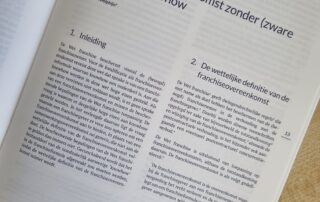Article Franchise+ – “Franchisor uses “derivative formula” (without his knowledge)” – mr. AW Dolphijn – dated September 9, 2020
Many franchisors will not be aware of the fact that they use a “derived formula” as referred to in the Franchise Act. However, such a “derived formula” can soon be found. If that is the case, various legal rights and obligations must be taken into account.
A derivative formula, as referred to under the Franchise Act, is a formula that, in the perception of the public, shows many similarities with the franchise formula and therefore evokes strong associations with that franchise formula. In such a case, the public will think that it concerns the same formula, while in practice there are two separate formulas, both of which are used by or on behalf of the relevant franchisor.
The derived formula can be a franchise formula in its own right, but that is not necessarily the case. This could be a webshop with the same brand name and wholly or partly the same house style, on which (largely) the same products are sold as in the franchise establishment). Another example is the situation in which the franchisor of a supermarket chain intends to set up a formula in the form of, for example, a chain of station shops, where more or less the same products are for sale as in the franchise establishment. Separate home delivery activities may also fall under a derived formula.
Formulas that are set up by a franchisor in addition to an existing franchise formula managed by the same franchisor, but which have their own trade name, house style, etc., as a result of which the public does not associate that formula with that existing franchise formula, are not counted as derivative formulas. The possible circumstance that the two formulas concern more or less the same services or products, or are aimed at the same relevant market, does not change this.
The franchisor who decides to use a derived formula (whether or not by the franchisor itself or via third parties) must notify the franchisees of this in a timely manner. In doing so, the franchisor must explain the content and purport of the derivative formula in question.
Subsequently, under certain circumstances, the franchisor must obtain the consent of the franchisee for the introduction of the derivative formula. If the use of the derivative formula may have financial consequences for the franchisee and that impact exceeds any agreed threshold amount, the franchisor will require prior approval.
Acting contrary to the rules of the Franchise Act can quickly result in an unlawful act. Franchisors are therefore well advised to always consider whether there is a legal concept of the “derived formula” when changing their activities.
mr. AW Dolphin – franchise lawyer
Ludwig & Van Dam Franchise attorneys, franchise legal advice. Do you want to respond?
Go to dolphijn@ludwigvandam.nl

Other messages
Continued activities of the franchisee do not violate a non-competition clause
A judgment was recently rendered in preliminary relief proceedings in ...
Car dealer wrongly not a franchisee?
The Franchise Act entered into force on 1 January ...
Suspension of payouts allowed by the franchisor
The District Court of Limburg ruled on 30 March 2023, ...
Franchising is on the rise: ‘There is still a huge amount of room for it in the Netherlands’
An interview with mr. AW Dolphijn about franchise. De Beren, ...
The franchise agreement without (heavy demands on) know-how
In the 2023-1 edition of Contracting magazine, I published a ...
Standstill period violation
On 15 March 2023, the District Court of Noord-Holland, ECLI:NL:RBNHO:2023:2636, ...







